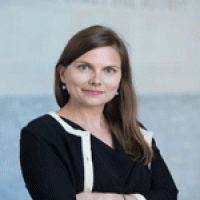International Organizations during the Cold War
Insights from International Organization Archives and Oral History Interviews.

A blog of the History and Public Policy Program
Insights from International Organization Archives and Oral History Interviews.

Above: Dag Hammarskjöld, second secretary general of the UN, outside the UN Building in New York
Insights from Archives and Oral History Interviews
After decades of growing influence, multilateral and international organizations are facing new challenges as the foundations of diplomatic relations shift. The European Union is the object of growing skepticism throughout the continent, skepticism that has only accelerated since Brexit. Calls for reform and strengthening of international organizations are increasingly replaced with statements that question their very significance.
At a time of growing distrust in intergovernmental organizations, a look back into their history can help us better understand and appreciate their role during the 20th century. Historical perspective also reminds us that, while there have always been voices of criticism and contempt, international organizations created spheres of cooperation in a divided world. Recent openings in the archives of several international organizations and new oral history projects come just in time.
According to the United Nations, archives of international organizations “serve as institutional memory. They provide evidence of the past and promote accountability and transparence of past actions.” Yet despite this important mission, archives of multilateral and international organizations have long been overlooked by diplomatic historians. There are a number of reasons for this neglect. Established primarily as support services for internal use, these archives function as the custodian of a living institution’s legislative, administrative, and scientific knowledge. Because they have fewer financial and staff resources than national archives, they are sometimes unable to accommodate large numbers of outside researchers.
Because numerous states have a say in the process, the declassification of records at the archives of international organizations takes longer than at national archives. This leads to the counterintuitive fact that some records produced by the International Atomic Energy Agency (IAEA)—an autonomous organization linked to the UN—can be accessed at member states’ archives, yet remain closed, or are derestricted much later, at the IAEA.
However, archives of international organizations have increased their efforts to open their historical records to the public in recent years, not least due to growing pressure from the research community and an ever increasing interest in their history.
In late 2016, the IAEA Archives launched a new website which, for the first time, provided outside researchers with a detailed overview of the archives’ holdings—a critical step to increase transparency. Some records series can even be accessed online, such as the historical records of the IAEA General Conferences. Over the past few years, the UN Archives has published a vast collection of documents on their website: almost 130,000 digitized items.
Like all bureaucracies, international organizations produce massive amounts of paper–much of it having little interest to diplomatic historians. But their archives bring staff relations and organizational cultures to life that aid the writing of the history of international organizations.
Reading the exchange of notes and letters between UN Secretary Dag Hammarskjöld and Ralph Bunche illustrates how the foundations for today’s international order—such as the creation of the IAEA—were laid despite crises ranging from the Suez Canal to the Hungarian Border during the 1950s. These documents also illustrate how much the Agency’s creation was influenced by the so-called developing nations—a decade before the Group of 77 was formed. The United States and the Soviet Union competed to prove themselves as the developing countries’ “true friend and champion in bringing them the benefits of the atomic revolution,” as noted by Gladys Walser, Dag Hammarskjöld’s observer to the IAEA negotiations and one of the few senior women involved in the Agency’s origins.
Reading the records of the IAEA’s Scientific Advisory Committee shows how in a field as sensitive as nuclear energy, scientists from East and West, North and South created a transnational community of experts to build the foundations of nuclear technology exchange, safety measures, and safeguards. It also helps understand the difficult relationship of politics and science in the IAEA.
The members of the Board of Governors and the Scientific Advisory Committee used the words ‘political,’ ‘technical,’ and ‘scientific’ not only as indicators to identify whether they were talking diplomacy or science, but also to thwart oppositional views. Saying that something was ‘political’ was often just another way to say ‘I don’t agree.’ They were also markers of difference between the diplomats among the governors and their scientist colleagues. This is also a history of managing the normative distinction between the IAEA’s scientific and political domains—a distinction that was central to the Agency’s self-description but hard to maintain in practice.
Oral history interviews such as the IAEA Oral History Series or the UN Oral History Project add yet another, more personal, perspective to the history of international organizations. If history is indeed a guide for the future, the archives of international organizations are a good place to start the tour.


A leader in making key foreign policy records accessible and fostering informed scholarship, analysis, and discussion on international affairs, past and present. Read more


The Nuclear Proliferation International History Project is a global network of individuals and institutions engaged in the study of international nuclear history through archival documents, oral history interviews, and other empirical sources. Read more


The Cold War International History Project supports the full and prompt release of historical materials by governments on all sides of the Cold War. Read more



